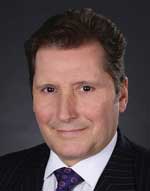News
Microsoft's New U.S. Channel Chief: Partner Enablement a Top Priority
Stephen Boyle spent his first four months on the job getting an education from partners and other Microsoft executives. Now he's vowing to provide some education in the form of partner enablement.
- By Scott Bekker
- December 02, 2015
Stephen Boyle is the newest head of U.S. channels at Microsoft. Formally known as the vice president of U.S. Partner Strategy and Programs, Boyle replaces Jenni Flinders, who retired earlier this year.
RCP caught up with the U.K. native after he'd had a few months to get his arms around the big job, which involves responsibility for engaging with and enabling Microsoft's 100,000-plus U.S. partners. For Boyle, it's a move from Microsoft's worldwide organization, where he was a vice president in the Enterprise Partner Group, to the U.S. subsidiary, run by Boyle's old Oracle Corp. colleague Judson Althoff.
Following are some excerpts from our late October conversation, lightly edited for flow and context.
RCP: What have you been up to since getting the job in July?
Boyle: As you can imagine, I've done a lot of listening. Eighteen months in Microsoft is a reasonable amount of time, but it's still a little bit of a learning experience transitioning from the worldwide organization to the U.S. sub. I've had the opportunity to get out in the field with Microsoft leaders like Judson Althoff and Dave Willis and Cindy Bates on the SMB side and many others. But I've also had the opportunity to meet with new and interesting partners across the U.S. as we drive our transformation, understanding who we've got in the partner community today and who we may need from a partner-expertise perspective going forward.
The first three or four months has been very much a rapid learning exercise for me and an opportunity to create a list of priorities in alignment with people like Gavriella Schuster and Phil Sorgen in the worldwide partner organization to make sure that we drive the priorities for Microsoft, but we also work closely with the partners to make it a win-win situation.
 "What I have heard is partners are very much in the information-and-knowledge-acquisition mode, and they're very keen for us to make sure that we fully enable them."
"What I have heard is partners are very much in the information-and-knowledge-acquisition mode, and they're very keen for us to make sure that we fully enable them."
Stephen Boyle, VP of U.S. Partner Strategy and Programs, Microsoft
What are your top priorities?
What I'm very happy to see is a lot of the partners are already on board with the cloud transformation that's required. Not just the new, what we like to refer to as born-in-the-cloud partners, but very much the partners who have been with Microsoft along the way for many, many years. I haven't had to spend a lot of time selling or explaining why we think this transformation is important.
What I have heard is partners are very much in the information-and-knowledge-acquisition mode, and they're very keen for us to make sure that we fully enable them and we make them as skilled as possible in the Microsoft products and services that support the cloud transformation. I think that's going to be, going forward, one of my top priorities -- just to make sure that all of the fabulous content that's available to Microsoft people is also available to partners, both on a technical and on a selling level.
Partner enablement, partner recruitment, making sure that I have the right partners in the ecosystem, and then the activation, working with the partner sellers and the Microsoft field sellers to bring business benefit to our joint customers -- those are our high-level short-term priorities. But my largest priority is making sure that I get the enablement engine right because, from there, it will help me recruit the right partners. Once I've got them in the ecosystem, it will help me better engage those partners in a selling motion.
What programs exist that you wish more partners knew about?
We're taking advantage of high-touch and doing two- to four-day workshops. We'll bring systems integrators and other partner types, LSP-type partners into a room and give them deep-dive classroom experience. But we're also leveraging new technologies like Massive Open Online Courses, the new acronym is MOOC, to reach a broader community.
About six months ago, we kicked off a very high-touch [program] -- a small number of people in a face-to-face environment. So we did four-day Azure workshops with Global Systems Integrators. And [in the last week of October we did] some with National Systems Integrators in Chicago and in Irvine, Calif. We're spending two to four days with about 100 to 200 people in a very focused environment with very hands-on, in-classroom experience.
It's frankly not scalable, and I obviously have to have a scale engine that reaches out to a much broader community of partners. Leaping all the way to the other end, we're using MOOCs, and they're often times driven by the education ecosystem rather than by Microsoft itself. But we've partnered with edX and one in particular launched in late September, and it was around the Cortana Analytics Suite. There was a five-week self-paced learning through this MOOC offered by edX, and we had in excess of 20,000 participants.
About the Author
Scott Bekker is editor in chief of Redmond Channel Partner magazine.